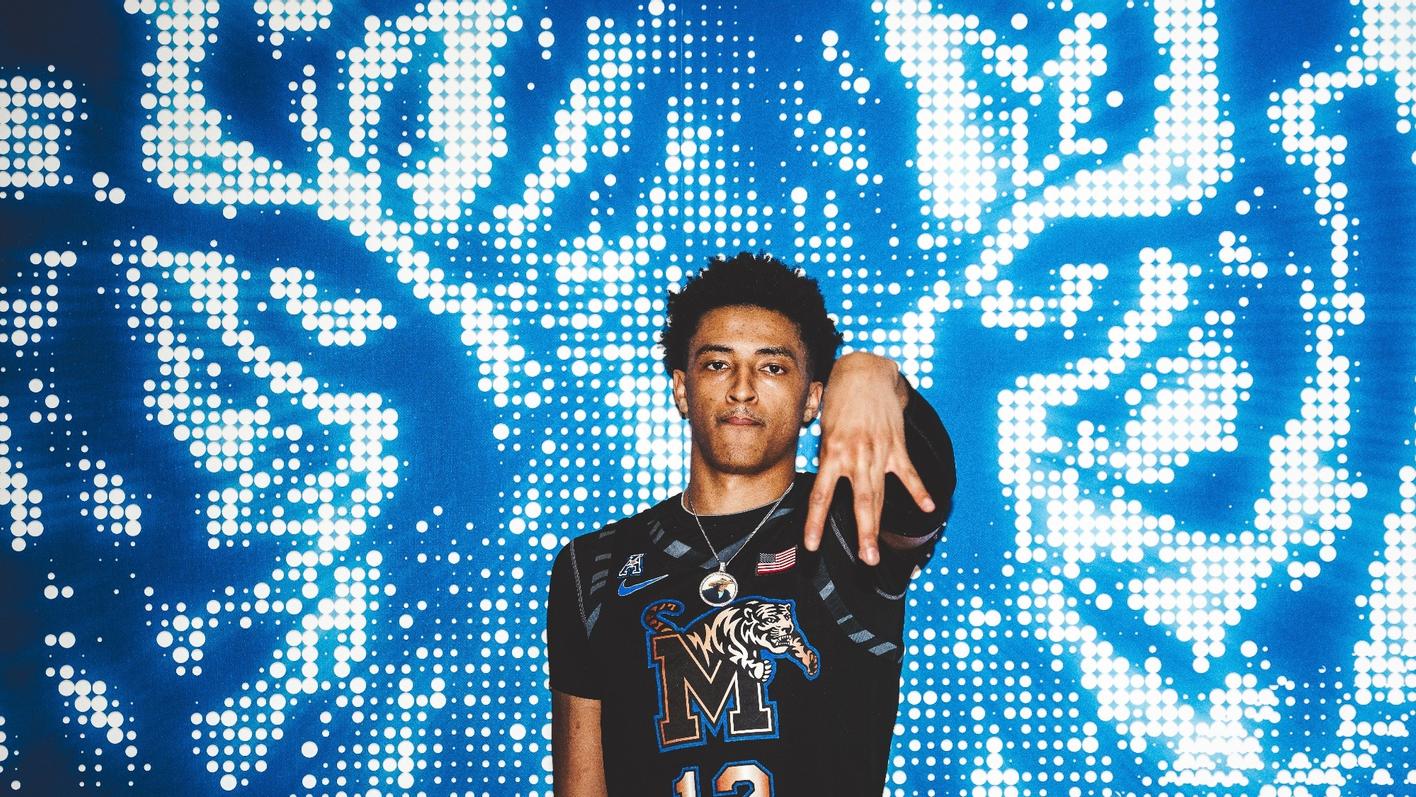BASKETBALL
Why The Notion of Memphis Basketball Having “NIL Issues” is Total Nonsense
Published
2 years agoon
By
Roman Cleary
On Tuesday morning, Tony Altimore reported that Memphis basketball has a top 20 budget amongst all division one men’s programs.
Memphis’ budget, listed as the 18th highest in the country, is reportedly $13.7 million. That’s higher than Gonzaga, North Carolina, UCLA and other power programs throughout the country. It’s also higher than the American’s average budget of $5.4 million, as well as the Big East’s average, the highest in the country amongst all conferences, of $13.5 million.
BASKETBALL SCHOOLS:
Who has the biggest hoops budgets?Basketball financial data is fun because it's not just the "usual suspects" who pour the most resources & devotion into their team
Here are last year's Top 20 MBB spenders, together with conf. avgs.
Any favorite surprises? pic.twitter.com/YM2AsAIF7D
— Tony Altimore (@TJAltimore) June 6, 2023
Now, some may view this fact to be obvious. Others may question why I’m even bringing it up. After all, the University of Memphis, as well as the city of Memphis, cares deeply about its men’s basketball program. Memphis basketball is the primary reason why Memphis is considered a basketball city by many.
Its popularity eventually inspired an NBA franchise to make its way to town.
Throughout their time on the hardwood, the Tigers have created many sports memories that the 901 will never forget. Larry Finch led the 1973 Tigers to the National Championship against John Wooden and UCLA. Keith Lee led the 1985 Tigers to the Final 4. Penny Hardaway, now the head coach at Memphis, led the 1992 Tigers to the Elite 8. And of course, John Calipari’s 2008 Tigers, the best team in Memphis’ history, made it to the National title game.
Though the program has tampered off since that season, the city’s love for it has hardly faltered. And now, with Hardaway approaching his sixth season at the helm, Memphis is slowly but surely getting back to where it needs to be.
Memphis’ “NIL Issues”
Unfortunately, that’s not where the focus is for most of the media. It’s not what many fans are focusing on either.
Instead, unnecessary narratives that put a bad light on the program continue to be created. And the newest one that’s taken charge throughout this off-season is especially silly.
Of course, I’m talking about Memphis’ apparent “NIL issues.”
Outside of Memphis’ need for big men, this has been far and away the biggest talking point for fans and media alike over the past few months. These talks really started to pick up when Memphis missed on Jaden Bradley after seemingly being a shoo-in for his services. And they only continued once Memphis went quiet in the portal throughout the month of May.
On Monday morning, Hardaway met with the media prior to playing a round of golf at TPC Southwind.
He mostly spoke on both the Mikey Williams and DeAndre Williams situations, but his comments on NIL were what caught the attention of many.
“It’s definitely the main reason why we can’t get what we want,” Hardaway said. “If we were just flat-out recruiting, then we would have an advantage. But now, it’s a little more difficult with NIL.”
Now, I’m not exactly sure why Hardaway said that. Especially considering that the Tigers landed a commitment from St. John’s transfer David Jones merely a few hours later.
The Explanation For These “Issues”
I suppose the best explanation I have is that it’s an easy excuse that he can give for some of Memphis’ failed recruitments. Because he can’t just flat-out say that Memphis’ boosters didn’t want to go into a bidding war for a backup point guard that averaged 6.4 points and 3.1 assists per game last season at Alabama.
Now, does Bradley project as a better player at Arizona next season? Yes.
Is he a former McDonald’s All-American? Yes.
But the reality is that ever since the Emoni Bates experiment failed, Memphis has refrained from dropping top-dollars on players that aren’t proven commodities. It doesn’t have money problems like most suggest, but it isn’t swimming in cash either.
Memphis still has to be more selective with its spending. It can’t be like Arkansas and throw a bag at anybody with a jump shot. It wants proven players that are guaranteed to produce, and will refrain from spending money on anything else.
Most people don’t consider this, but NIL “contracts” are essentially a one-way investment. Boosters aren’t getting their money back 99.9% of the time. If one chooses to give a player NIL money, that person is doing it for the love of his or her basketball team and nothing more. And they want to make that investment count in any way they can.
Proven Commodities
Going to last year, of course Memphis was going to spend money on somebody like Kendric Davis. He was a highly productive player at SMU for three seasons, and was the AAC Player of the Year in 2022. Davis was a proven commodity.
Moving over to this year, Memphis chose to spend money to get Florida State transfer Caleb Mills. The 6-foot-5 guard is a former AAC Preseason Player of the Year at Houston, and has proven to be an elite scorer at the collegiate level. And he’s done that at two high-level institutions. Mills is a proven commodity.
And in recent days, Memphis outbid the likes of Kentucky to get Jones. The 6-foot-6 guard has now averaged double figures at two different Big East programs. And he’s also reportedly graduating early to play for Memphis this year. This shows both production and dedication on the part of Jones, which is why he is a proven commodity.
Ask Yourself This Question
Whenever you hear that Memphis has “NIL issues,” all you need to do is sit back and use your thinking cap for a second. We were all taught critical thinking in school for a reason.
And when you sit back and use your thinking cap, you need to ask yourself just one question. Does this make any sense?
Think about it.
This off-season, Memphis has landed a 13-point scorer from the ACC (Mills). It has landed another 13-point scorer from the Big East (Jones). It was able to get a division two National Champion that received interest from over 120 programs (Jonathan Pierre). And it was also able to pull an NBA Draft prospect away from the NBL at the 11th hour (Teafale Lenard).
On top of that, the program is attempting to bring back DeAndre Williams. If his waiver for an additional year of eligibility gets approved, he’s not coming back for free.
And as of now, Mikey Williams is still inked to join the Tigers this season. He’s been a walking NIL contract since he was 14-years-old, and is the most famous member of the 2023 class other than Bronny James.
So, factor all that in, and ask yourself the same question. Does it make any sense, any sense at all, to say that Memphis has NIL issues?
No. No it doesn’t. At least not in the way that most people are insinuating it.
Does Memphis Actually Have “NIL Issues?”
Memphis doesn’t have as much money as a school like Duke. And it isn’t exactly fond of getting into unnecessary bidding wars. But that’s how it is for many programs across the country.
Memphis still has the resources that it needs to build a winning team and a winning program. It has especially proven that over the last week with the acquisition of Jones.
The truth is that these claims of NIL issues have always been total nonsense. And those continuing to make these claims will only look that much more asinine as time goes on.
Memphis basketball does not have “NIL issues.”
Memphis basketball doesn’t have money problems.
It is simply playing chess, and not checkers.
Senior Editor for Tiger Blueprint. See more of my work on Bluff City Media, where I’m the Memphis basketball beat writer, the Men in Hoodies podcast on Apple and Spotify and on “Sports with Roman Cleary” live on University of Memphis Radio—The ROAR Fridays from 3-4 p.m. during the fall and spring.

You may like
-


Hitmen Hoops, Tiger Blueprint contributors make 2024-25 Predictions
-


Best test ’till Thanksgiving; How to beat UNT
-


St. Jude Classic Tip Off Preview
-


‘So you’re saying there’s a chance?’; Pac-12, Memphis talks could reignite
-


Vibe check; Loss to Navy and AAC commitment were bummers, die-hards show for MTSU game…Is it enough?
-


Memphis AD Ed Scott Weighs in on Pac-12 and Long-Term Goals


Hitmen Hoops, Tiger Blueprint contributors make 2024-25 Predictions

Three Key Takeaways from Memphis’ Scrimmage Against Alabama

Where Does the Media Project Memphis Basketball This Season?

Get to Know the Transfer Class for Memphis Football

Memphis Football Ranked No. 20 Transfer Class in the Country by Rivals

